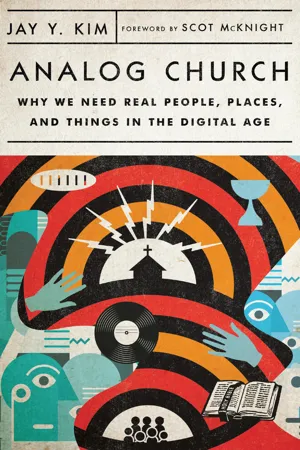NOT LONG AGO, a friend was showing me a couple of the dating apps on his phone. I felt like a dinosaur watching him deftly navigate what seemed like an endless stream of potential dates. Jenny and I started dating in 2003 and have been married since 2009—just about the time when dating websites and apps were in their infancy. So I watched, bewildered, as my friend scrolled quickly through a dizzying variety of profiles, communicating his interest or lack thereof by swiping with ninja-like precision.
I have nothing against online dating. I have several friends who never would have met their spouses if it weren’t for technology, and the world is a better place because they’re together. The benefits are obvious. What baffled me was my friend’s nonchalance and quick trigger. I asked him, “How are you deciding so fast? What if you would’ve really hit it off with that person? How can you dismiss so many people so quickly?” He looked at me inquisitively and said, “Dude. It’s not that serious.”
This is our digital world. Even the most important decisions, like the people we choose to enter into meaningful relationships with—maybe even a lifelong commitment—are made with shocking speed. Anything less is considered archaic. And this doesn’t just apply to dating: the digital age has affected, and in some cases infected, all spheres of life, including the most vital part of the Christian life: discipleship.
Despite our various mission statements, those of us who serve the local church share the same purpose: to introduce people to Jesus Christ and to invite them to follow him with their whole lives. Since the very beginning, this has been an invitation into a lifelong process that involves patiently journeying alongside others. This is what the Bible means when it talks about discipleship—the life of apprenticeship under Jesus, learning and living his ways, being shaped and reshaped into his likeness alongside others. There is no more important endeavor in the Christian life. As Dallas Willard wrote, “The greatest issue facing the world today, with all its heartbreaking needs, is whether those who, by profession or culture, are identified as ‘Christians’ will become disciples—students, apprentices, practitioners—of Jesus Christ, steadily learning from him how to live the life of the Kingdom of the Heavens into every corner of human existence”4 (emphasis mine).
Willard wrote that discipleship is a process of steadily learning how to live the Jesus way. Steady—consistent, unwavering, focused movement in one direction.
The Greek fabulist Aesop gave us the timeless tale of “The Tortoise and the Hare” and with it, the popular idiom, “Slow and steady wins the race.” Enmeshed in the speed of the digital age, we’ve forgotten the moral of this great story. We’ve forgotten the value—even necessity—of steadiness, slow as it may seem sometimes. Instead, we’ve given ourselves over to the technological ethos of Silicon Valley, which tells us that everything can always be faster, more efficient, more accessible. And as digital technologies continue to accelerate to lightning speeds, we revel in our dominance and prowess. But as with the hare, our distraction is lulling us to sleep in the all-important journey of discipleship.
WHEN VALUES TURN VICIOUS
The digital age’s technological advancements boast three major contributions to the improvement of human experience, which in turn have become its undeniable values:
1. Speed. We have access to what we want when we want, as quickly as our fingers can type and scroll.
2. Choices. We have access to an endless array of options when it comes to just about anything.
3. Individualism. Everything, from online profiles to gadgets, is endlessly customizable, allowing us to emphasize our preferences and personalities.
While these contributions have added some comfort and convenience to parts of our lives, the added value is coming at great cost, as our collective desire for and devotion to digital technology becomes increasingly excessive. Particularly in the ways these digital technologies have influenced the church, many of us have gone off the rails. Even good things have dark sides when taken to their extremes. When values aren’t held accountable, they turn vicious. Sadly, for so many, that’s exactly what’s happened. These once positive contributions of the digital age have resulted in our undoing:
The speed of the digital age has made us impatient.
The choices of the digital age have made us shallow.
The individualism of the digital age has made us isolated.
IMPATIENT
According to a research study funded by Microsoft, between 2000 and 2015 the average attention span decreased from twelve seconds to eight seconds.5 Twelve seconds doesn’t seem like a very long attention span to begin with, and to think that, parallel to the rise of the internet, it dropped so significantly in just fifteen years is staggering. The scientific validity of the study has been disputed by some, claiming that attention spans can’t be quantified this way because they vary so broadly depending on the specific task at hand.6 This seems reasonable enough, but what neuroscience is beginning to make clear is that the digital age is indeed rewiring and reshaping us into increasingly impatient people.7
In his book The Tech-Wise Family, Andy Crouch defines digital technology as an “easy everywhere” medium, meaning it’s easy to access and it’s accessible almost everywhere.8 Naturally, we’ve adjusted quickly. Imagine yourself walking into a coffee shop to do some work and discovering that there’s no Wi-Fi. Then, imagine you order a drink and sit down to do some internet-less work, only to discover that your MacBook is displaying the spinning pinwheel of death. Now, imagine the overwhelming onset of annoyance you feel. Maybe it’s more than annoyance; maybe it’s anger. Now, step back for a moment. We’re talking about instant access to an ever-expanding world of information (in a place that was once solely reserved for drinking coffee, having conversations, reading a book or the paper, etc.), using a device with so much computing power that just a few decades ago it would’ve required tens of thousands of square feet of space. And now that you’ve got to go back to simply enjoying a cup of coffee and sitting alone with your thoughts for a while, a borderline emotional breakdown ensues.
The digital age has made our lives better in some ways, but it certainly has not made us better. It can’t. As Crouch puts it, “Technology is a brilliant expression of human capacity. But anything that offers easy everywhere does nothing (well, almost nothing) to actually form human capacities.”9
Our growing impatience is a prime example of this. The speed of the digital age is damaging, even destroying, our ability to wait patiently and to live with a long-term perspective. We admire the hare’s speed and we mock the tortoise’s slowness, forgetting that in the end, steadiness wins the race.
SHALLOW
Because we lack steadiness, patience, and long-term perspective, we’re dangerously susceptible to the allure of quick-fix, dopamine-inducing digital experiences. Coupled with the plethora of available choices, we live in constant risk of spiraling into the abyss of our devices. According to professor and author Adam Alter, the average phone usage among adults rose from eighteen minutes per day in 2008 to two hours and forty-eight minutes per day in 2015.10 This isn’t because we’re talking to each other more. On the contrary, we’re talking to each other less. The dramatic increase is due to emails, internet use, and, in large part, social media. Recent estimates are that there are over three hundred million active users on Snapchat, three hundred thirty-five million on Twitter, one billion on Instagram, and more than two billion on Facebook.11 (Almost) everyone everywhere is on social media—especially millennials and Generation Z.
All our toggling back and forth on our various social media platforms isn’t just making us impatient. It’s also making us shallow. The fast-paced (the scrolling prowess of our thumbs is at an all-time high), easy-access (our phones are within reach just about anywhere we go), and endlessly customizable (we follow and unfollow who we want, when we want) world of social media is stunting our ability for the sort of depth that Christian discipleship requires.
In his book Deep Work, Cal Newport gives this sobering warning: “Spend enough time in a state of frenetic shallowness and you permanently reduce your capacity to perform deep work.”12 The digital age entices and invites us into this never-ending stream of “frenetic shallowness.” Scroll, look, like, comment, judge, envy, repeat. It’s fast, it’s quick, it’s easy, and it’s often thoughtless and careless. It’s shallow and directly counterintuitive to the deep work of discipleship.
Its most insidious effect on us, however, may be the way its constant presence in our lives actually rewires our desires. Based on significant research, Newport concludes that “once you’re wired for distraction, you crave it.”13 If we’re not careful, social media will change not only our ability but also our appetite. We begin to crave shallow experiences. As the writer James K. A. Smith reminds us, what we crave, what we desire, shapes our identity.14
C. S. Lewis’s words ring truer than ever: “We are half-hearted creatures, fooling about with drink and sex and ambition when infinite joy is offered us, like an ignorant child who wants to go on making mud pies in a slum because he cannot imagine what is meant by the offer of a holiday at the sea. We are far too easily pleased.”15 The shallowing effect of the digital age isn’t just about how we behave; it’s about who we’re becoming. And who we’re becoming in the digital age are shallow shells of the fully alive human beings God designed us to be.
ISOLATED
As the speed and choices of the digital age send us hurling toward impatience and shallowness, they culminate in its most damaging consequence: isolation. Social media in particular lures us in under the guise of connection, but beneath this mask is the reality that social media, and digital spaces as a whole, are for the most part lonely places.
This is because social media is fueled by voyeurism—that broken inclination within each of us to peek behind the curtain of other people’s lives. Rather than connecting us, the voyeuristic nature of social media actually detaches and distances us from one another, as we find ourselves running aimlessly on the treadmill of comparison and contempt. We feel like we can see one another’s lives, but none of us ever feel truly seen. Digital connections often act as poor disguises for our real-life isolation. Sherry Turkle says it this way: “Networked, we are together, but so lessened are our expectations of each other that we can feel utterly alone.”16
True human connection is fueled by empathy—the God-given ability to step into another’s shoes and open ourselves up to another’s story, not to compare and contrast, but to be overwhelmed by compassion, to “rejoice with those who rejoice; mourn with those who mourn” (Romans 12:15). This requires patience, depth, and the risk of stepping into real community with real people and their real lives in real time and in real space.
At their best, social media and other digital spaces can be wonderful initiating spaces that lead to true human connection, but they can never become home for those connections; they’ll always fall short and leave us wanting. When I FaceTime with my wife and kids (our digital gathering space when I’m away), it’s a wonderful benefit of technology—but ultimately it only makes me eager to get home and give them real hugs. That’s digital at its best—increasing our appetite for the real, a...

